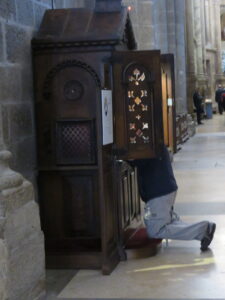When I was a kid, every Saturday afternoon I walked to St. Margaret Mary Church, took my place on line and waited to confess. Once inside the dark tomb of the confessional, I recited the words I had been taught, “Bless me father, for I have sinned,” and listed my 9-year-old transgressions. “I yelled at my sister. I coveted my friend’s Barbie dream house.”
I couldn’t see the priest’s face, although I could guess by his voice who was behind the screen. Still, it had the appearance of anonymity, which I liked. I could pretend I was alone, speaking into the void. The idea that today the Rite of Reconciliation (aka confession) is often conducted face-to-face makes me appreciate the days of dark anonymity.
It’s not surprising then, that for a long time, I thought of confession as a solitary undertaking. The church where I worship now says a corporate prayer of confession every week before communion and it took me a long time to get used to. What bothered me was “we.”
“Merciful God, we confess that we have sinned against you…”
It was grating to my ears. After all, wasn’t confession just between me and God? Well, yes and no.
Certainly, I am called to confess my individual sin to God. Psalm 32 expresses this beautifully:
“Blessed is the one whose transgression is forgiven, whose sin is covered … For when I kept silent, my bones wasted away through my groaning all day long.For day and night your hand was heavy upon me; my strength was dried up as by the heat of summer.I acknowledged my sin to you, and I did not cover up my iniquity; I said, “I will confess my transgressions to the Lord, and you forgave the iniquity of my sin.”
This is a beautiful picture of God’s faithfulness to forgive the actions I have taken that offend God, But those actions spring from something deeper and more intractable than a simple lapse in judgment: sin as part of our nature. A corporate confession recognizes that sin is more than actions; it is a part of human nature, common to everyone in the sanctuary with me.
Confessing that we’re all in the same boat — that we share in this “sin nature” — actually frees me from the solitary shame that can come from concentrating on my own transgressions.
And because it is common to all, it removes the belief that I am uniquely sinful, alone in my sin. In his classic book Life Together, Dietrich Bonhoeffer puts it this way:
“He who is alone with his sin is utterly alone.”
Which is exactly where the Enemy of my soul wants me. Isolated, shamed, cut off from the consolation of community.
And so, I have come to see the necessity and the beauty of our corporate confession. Yes, I am still called to bring my individual sin before God. But in adding my voice to others’ I am breaking through my solitary shame and strengthening the bonds of community. I am laying down my pride and my perfectionism and acknowledging my frailty and accepting others’.
In Romans Ch. 12, we hear St. Paul describing the qualities of a believer: “Rejoice with those who rejoice, weep with those who weep”. He might also have said, “Confess with those who confess.” In joy, in mourning, even in sin, we are not alone. This is the great gift of community.
In his introduction to Life Together, Bonhoeffer proclaims this most profound truth:
“Therefore, let him who until now has had the privilege of living a common Christian life with other Christians praise God’s grace from the bottom of his heart. Let him thank God on his knees and declare: It is grace, nothing but grace, that we are allowed to live in community with Christian brethren.”


Very helpful Laura. I used to always say “I confess” during the prayer, but now say “we” for all the reasons you have shared. Thank you 🌷